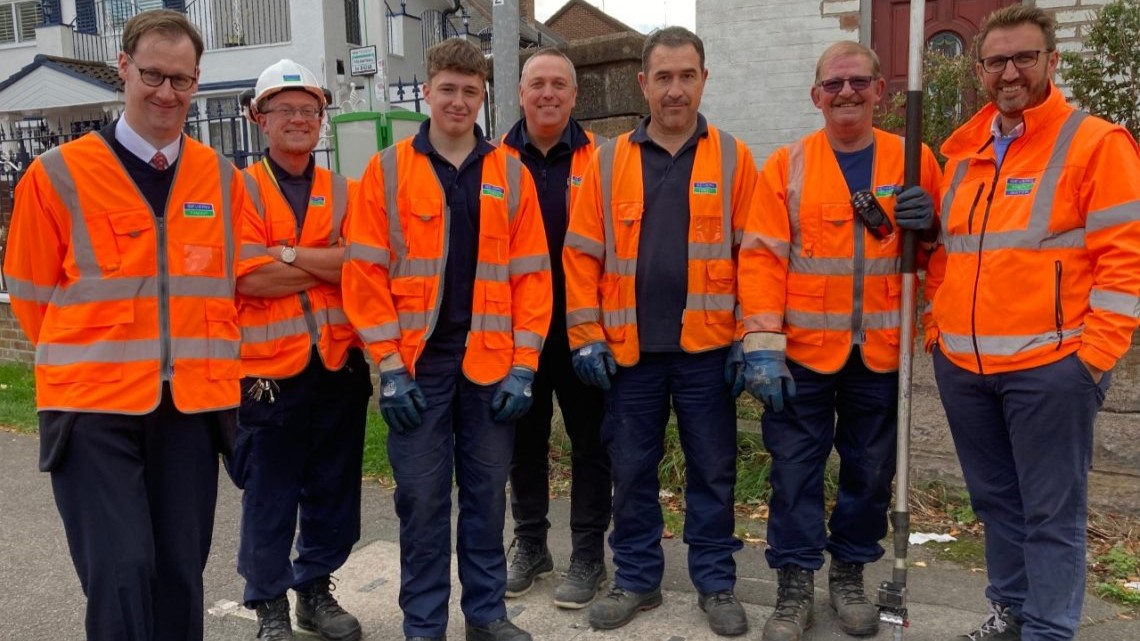In a visit to two combined storm overflows (CSOs), Tom Randall, MP for Gedling, was able to learn first-hand about the Severn Trent network and how its teams are helping to improve the health of rivers.
Combined sewer systems transport rainwater runoff and waste water, including sewage, in the same pipe to the sewage treatment works. The combined network can accommodate most of the rain water but not all. When more storm and ground water enter the sewer system than the pipes were designed for, combined storm overflows act essentially as safety valves to stop people’s homes and businesses flooding after heavy rain.
Climate change, population growth and an increase in hard landscaping – such as paved driveways – are contributing to more intense rainfall, more runoff and more sewage, increasing the pressure on the sewer system.
Mr Randall was shown a CSO on the network in Gedling, as well as a Surface Water Outfall on the Ouse Dyke watercourse. The visit included discussion around the steps that Severn Trent is taking to pledges. Mr Randall also met one of the company’s River Rangers, Luke McCusker, who is part of a team dedicated to protecting the region’s waterways and keeping rivers healthy and thriving.
MP for Gedling, Tom Randall, said:
“After my visit to Stoke Bardolph sewage treatment works earlier this year, it was valuable for me to see the wider network, and the work Severn Trent is putting in to make our region’s rivers the healthiest they can be.
“All the water that comes from the houses and storm drains in and around Gedling when it rains enters the combined sewer network, and if more water enters the sewer system than the pipes were designed for, combined storm overflows act as safety valves to stop homes and businesses from flooding.”
Mr Randall added:
“As Gedling’s MP, I voted for the Environment Act which introduced new measures to reduce the use of storm overflows. This resulted in the introduction of the ‘Storm overflows discharge reduction plan’ in August, which sets stringent new targets to protect people and the environment and requires water companies to deliver the largest infrastructure programme in history.
“I am very grateful to Severn Trent for taking the time to show me their work and to hear about the steps they have already and are continuing to take to reduce the use of storm overflows, in accordance with the Environment Act.”
Ian Smith from Severn Trent, who hosted the visit, said:
“It was a pleasure to host this visit, as opportunities like this play an important part in helping our communities to understand how the network operates.
“In Gedling, we lifted a manhole cover and using the ‘Go-Pro’ camera on a stick were able to show the inside of the sewer and storm overflow to the MP– it’s helpful for MPs to see first-hand our network in this way, and also the steps we’re taking to improve river health.”
Severn Trent Senior River Ranger, Luke McCusker, said:
“Opportunities like this play an important part in helping our communities to understand how the network operates. It’s helpful for MPs to see first-hand the kind of pressures that they can be put under due to improper disposal of things like wet wipes, which can cause real issues in the system, as well as the steps we’re taking to make our region’s rivers the healthiest they can be.
“We are always looking at what more we can do to support our communities and to enhance the local environment. Our team of River Rangers are out and about in the community talking to customers, farmers and everyone else who has a role to play when it comes to protecting rivers and the environment on a daily basis.”
Get River Positive was launched in March 2022 to provide a clear and actionable response to calls for a revival of rivers in England. Severn Trent is moving faster, in some cases 20 years ahead of sector targets, to improve the quality of the region’s rivers.
The company has committed that its operations will not be the reason for any stretch of river in the whole Severn Trent region to be classified as unhealthy by 2030. According to Environment Agency data, Severn Trent is currently responsible for 18% of reasons for rivers in its region not achieving good ecological status and is confident that by December this year, this will reduce to 15%, with the remaining 85% of reasons attributed to other sectors.
Find out more about Get River Positive at www.getriverpositive.co.uk
Severn Trent’s Get River Positive commitments:
1. Ensure storm overflows and sewage treatment works do not harm rivers
2. Create more opportunities for everyone to enjoy our regions‘ rivers
3. Support others to improve and care for rivers
4. Enhance our rivers and create new habitats so wildlife can thrive
5. Be open and transparent about our performance and our plans



